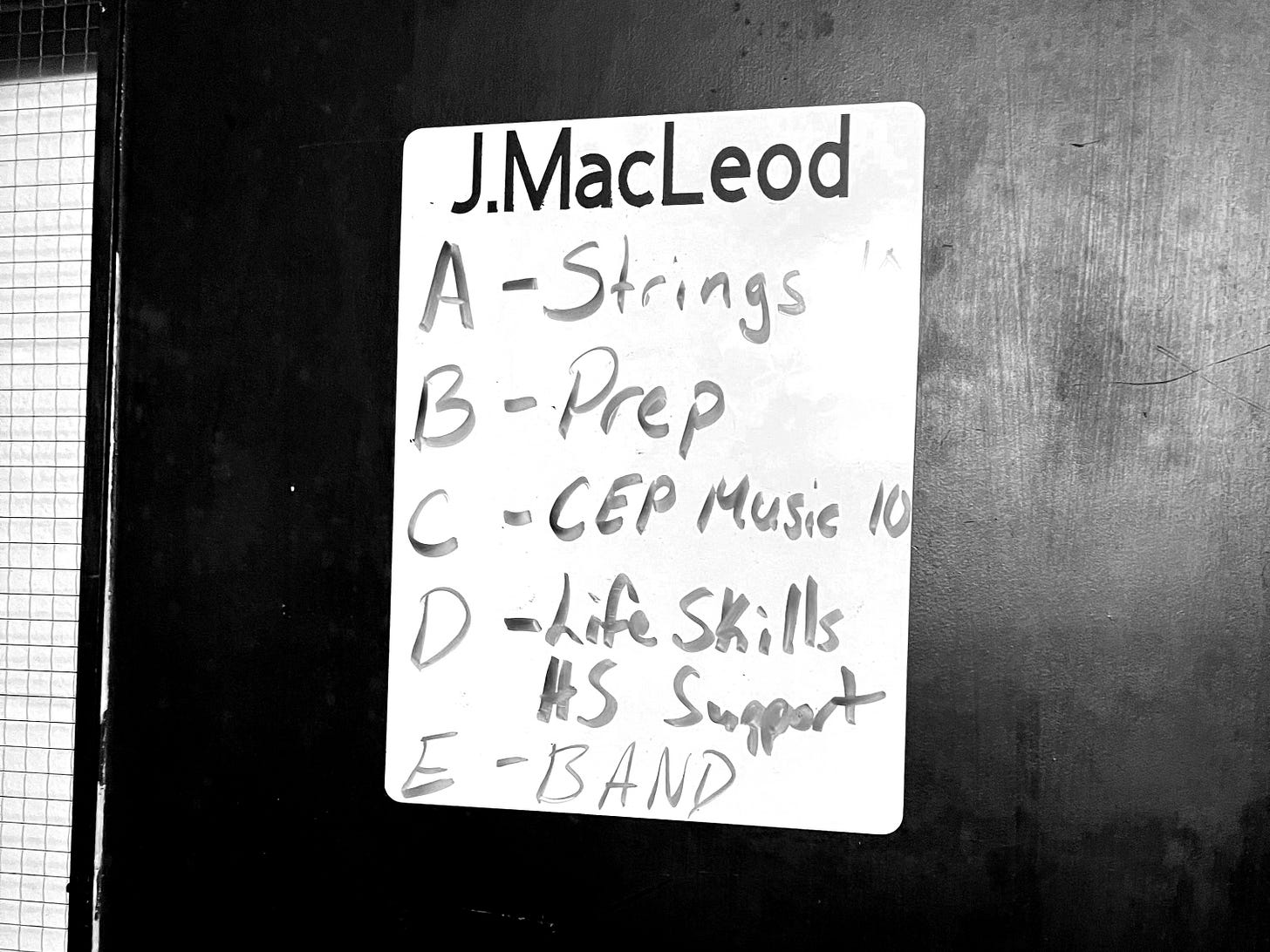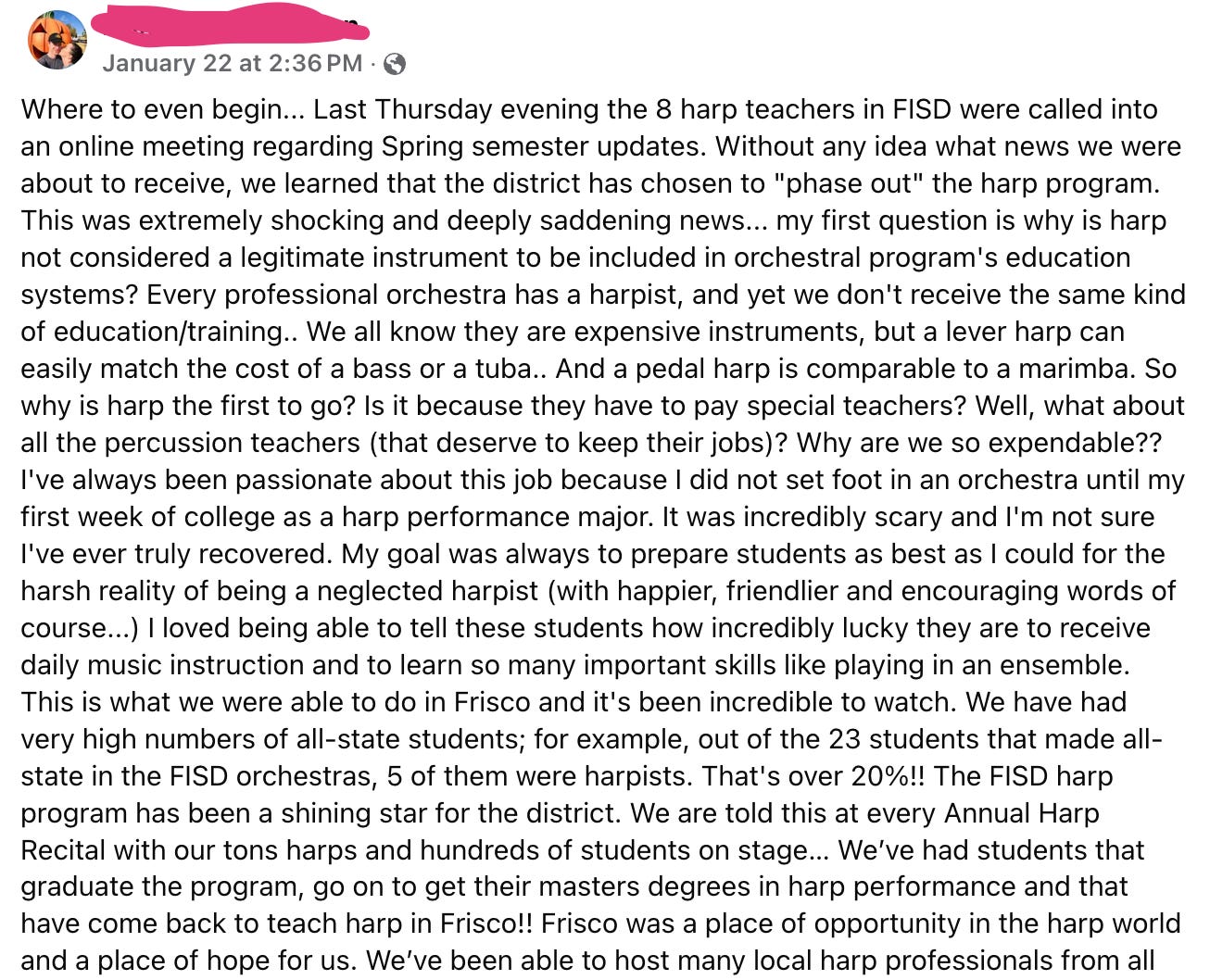and a happy new year?
why (arts) advocacy matters in this new political, cultural, & economic era

Over the past few days, harpists in the southeast have been abuzz on social media over the abrupt cancellation of the Frisco ISD (Independent School District) harp program, allegedly due to significant operational deficits. Public school harp programs have been around for longer than you think: Cass Tech's historic harp program will celebrate its centennial this year. In February, I'll be visiting the Mesa School District harp program in Arizona, which began in 1974 and now supports nearly 250 students, making it the largest public school harp program in the US. There are several programs in Texas and in New Jersey (Cicely Tyson School of the Performing Arts in East Orange), Georgia (Urban Youth Harp Ensemble in Atlanta—started as a non-profit org/charter school partnership), and even my own state of Florida (Blake High School in Tampa), which I visited when I first started teaching at FSU.

In conversations about accessibility and diversity in the harp world, public school harp programs are a beacon of hope. By reducing financial barriers around harp education (cost of private lessons and instrument), they encourage a broader demographic of students to participate in re-shaping the harp's sociocultural identities. In turn, the current professionals in the field—most of us who were able to pursue the harp because our parents figured out how to pay for an elite, private music education—have to re-consider how we're teaching and what standards we're enforcing. Concurrent with changes in the harp's landscape are changes in the music industry on the whole, not to mention significant social, economic, and political changes that our students have to grapple with and that those of us with secure jobs don't.
Then, there's the reality that those secure jobs can disappear, too. Frisco ISD is an immediate example, but another example close to home (my other one 🙃) is the Kitchener-Waterloo Symphony, which was a salaried orchestra that declared bankruptcy in 2023 and only recently resumed operations after more than a year of tireless advocacy. There's also Astral Artists—while not secure work for the musicians themselves, offered them an artistic community and employment for arts administrators. Even a tenure-track university job like mine could be at risk as administrators fret over the looming enrollment cliff; arts and humanities programs have already been shuttering at smaller post-secondary institutions across the country.
let me get mine, you get yours
Originally, I had wanted to write about this Derek Thompson essay for The Atlantic about the rise of people spending more time alone, and I had even started it under the heading “permeable embodiment.”
I got stuck fleshing out my ideas, so while I was ruminating to Patrick, I started telling him about the sociocultural habits I find frustrating about the US: the inordinate lack of hospitality culture and civic education (unlike in Japan), propensity for the obscenely gargantuan (property, houses, cars, portions), obsession with privatization and individual freedom…the list could go on. Even human relationships—friends, family, partners—have taken on this transactional feeling that I described as when ‘words with friends’ becomes a one-sided text conversation. As in, the messy permeability of real-life interactions with people disappears when your main form of communication is through a phone.
Patrick responded, "do you mean the attitude of ‘I just want to get mine’?”
Maybe a therapist might describe my resistance of this sentiment as just a struggle with emotional boundaries (#pisces), but I think the idea of getting mine is entirely related to various collapses in society and in the arts, in which we—especially in the educated middle and upper classes—are completely unable to imagine that there is a huge benefit in not benefiting!
Let's talk about artistic, for example. Between being in the arts and in academia, I feel like I am always around people who are constantly self-promoting, or I feel pressure to self-promote for the purposes of visibility in the field or workplace. Then, there's also the prevalent culture of getting mine, in which it's very obvious that everyone is just trying to do their own passion project for which they can get recognized; when it comes to sharing resources (time, funding), I've learned very quickly that very few people care to stick their neck out for things that inconvenience them or aren't advantageous to them. So, figuring out how to use the language of mutual benefit becomes a real survival mechanism.
Harpists deal with the extra challenge of being pitted against each other. Why? There's often only room for one of us—in orchestra jobs, teaching jobs, summer festival fellowships—and even in sectors that aren't as structurally exclusive, harp is used so uncommonly that freelancer turf wars can become intense. So, it becomes even more challenging to spread the love and work together to create opportunities for each other.
The paradox of advocating more strongly for the harp involves dismantling one of its key values (at least in Western music cultures) that currently helps us get work: rarity. In my line of work as a harp soloist, I know of one extremely well-connected colleague who has made it very difficult for other, younger harpists to share in her network. So, some of us who are also trying to carve solo careers have had to create our own niches to avoid feeling stuck. While I can't speak to the intentions of other solo harpists, in my case, I'm grateful for the challenge of pushing myself to find opportunities outside the norm. It's really not about “Oh, look at Noel diversifying the harp,” but it's about doing the work to place the harp in different spaces so that that pathway now exists for other harpists, and we can all work together to improve knowledge and skills in that particular area.
what next?
The Frisco ISD issue speaks to a deeper ecosystem that we as harpists need to fight even harder. The value of a harp program cannot be recognized for its placement success in All-State ensembles or its preparation for students to enter the harp world IF the basic concept of a harp has no broad value to society, or if it continues to be viewed as a highly rarified (and thus nonessential) thing because we perpetuate that value.
My research of Change.org's business model tells me that its petitions don't typically have a great success rate (sign it anyway!), so while I am hoping for the best, I don't know whether the harp program can realistically be saved. Whatever happens, do what you can to continue advocating for the harp and for your students.
Do weird or cool or ambitious projects with the harp and make sure to get write or write about it to spread the news; connect with music & social advocacy organizations; start your own local harp program; collaborate with people way, way, way outside music, which is the easiest way of showing how music has a place in other parts of society.
My final hot take? Encourage your harp students to see that their love of the harp might be best served if they combine it with other interests. As much as I love recruiting performance majors and want them to find their success as performers, I also want to teach kids to see that their training and perspectives as musicians has immense value off the stage, on sidewalks, in neighborhoods, in city hall, and beyond.
‘Til next time,
Noël
This week's Corner of Wondrous and Powerful is sort of about relationships:
📚 “The Anti-Social Century” by Derek Thompson (paywalled, contact me for the PDF)
👂🏼 “Onanist” by Ethel Cain, from her new album Perverts
👀 Monsieur Lazhar by Philippe Falardeau, if you want to watch a tear-jerker about people dealing with complex emotions around losing loved ones, but also about teachers and students and using literature (art) to come to terms with the shit that life throws at you.



